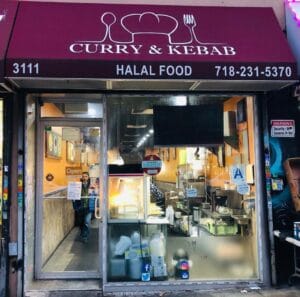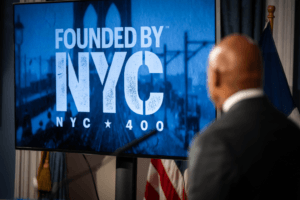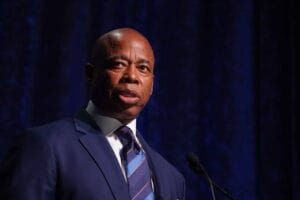Halal Businesses in New York City: An Investigative Report

In an attempt to explore and investigate how halal some Muslim businesses in New York City are, I recently visited 3 Muslim businesses in Brooklyn and The Bronx.
In Brooklyn, I interviewed the CEO/Manager of Al-Rayaan Muslim Funeral Services headed and managed by Imtiaz Ahmed, and I took a thorough tour of their day-to-day business operation. On the other hand, in The Bronx, I paid a visit to two of the most popular halal restaurants in the county and interviewed the managers of the two establishments. These two restaurants are: Curry and Kebab Restaurant and Neerob Restaurant.
Imtiaz Ahmed, the manager of Al-Rayaan Muslim Funeral Services in Brooklyn, discussed how his funeral home ensures that Muslim funeral services are conducted in a halal manner.
As a Muslim funeral home, Al-Rayaan adheres to the principles of Islam and follows the practices and procedures in accordance with Islamic law, Ahmed said.
“When a deceased Muslim is brought to us, the first step is to wash the body according to Islamic principles and guidelines and wrap it in a white cotton or linen shroud,” Ahmed explained. “We then arrange Janaza prayer for the deceased at MCC Mosque next door, and thereafter take the corpse to the cemetery to conduct the other funeral service in accordance with Islamic traditions.”
In terms of challenges, Ahmed noted that finding appropriate places to bury Muslim corpse has become a serious issue in New York City. However, Al-Rayaan believes that this could be easily addressed if government can allocate a place to be called Muslim Cemetery.
“Our major problem right now is finding places in New York to bury Muslim corpse. This is a Muslim community a serious issue that Muslim Communities in the city are facing. We therefore hope that the government can come to our aid by providing us a space for Muslim Cemetery,” Ahmed said.
As for handling situations where the deceased did not specify their wishes for a halal funeral or where family members may have conflicting opinions on what constitutes a halal funeral, Ahmed said that Al-Rayaan consults with family members and religious leaders to determine the appropriate course of action.
When asked about any unique features or services that Al-Rayaan offers to meet the needs of the Muslim community in New York City, Ahmed mentioned their transportation services, family rooms for prayers and gatherings, and assistance with the legal and administrative aspects of the funeral process.
In another interview, two halal restaurant owners in the Bronx, Muhammed Alam of Curry and Kebab Restaurant and Muhammed Rahman Khokob of Neerob Restaurant, discussed how they ensure that their restaurants are halal.
As Muslim restaurant owners, Alam and Khokob adhere to the principles of Islam and follow the practices and procedures that are in accordance with Islamic law.
“When it comes to halal food, we have to be very careful in choosing the right ingredients,” Alam explained. “We make sure that all our meats are sourced from halal-certified suppliers and that the other ingredients used in our dishes are halal.”
In addition to sourcing halal-certified ingredients, Khokob noted that they also pay attention to the preparation and cooking of their dishes.
“We have to make sure that our cooking methods and utensils are clean and that we are not using any alcohol or pork products in our dishes,” Khokob said. “We also make sure that our staff is trained in the proper handling and preparation of halal food.”
The process of obtaining halal certification for operating a halal restaurant, according to Alam and Khokob, is simple and reasonable because the product suppliers are usually the ones that required to go into a rigorous certification process as opposed to vendors. Restaurants order their products and ingredients from these certified halal vendors and put up signs that indicate their products and services are halal.
While maintaining halal standards can be a challenge, both Alam and Khokob noted that it is important to them to provide their customers with the best quality halal food.
“Maintaining halal standards can be expensive and time-consuming, but it’s worth it to us because we want to provide our customers with the best quality food,” Alam said.
When it comes to accommodating the needs and preferences of customers from different Muslim cultural backgrounds, both Alam and Khokob noted that they offer a variety of halal dishes and are sensitive to the customs and traditions of different Muslim communities.
“We have customers from everywhere in the Bronx and beyond, and we try to offer a variety of dishes that cater to different tastes and preferences,” Khokob said. “My customers are all happy with me as we also try to be sensitive to the customs and traditions of our customers and make sure that we are providing a welcoming and inclusive environment.”
More so, when asked about the average cost of opening a halal restaurant in the city, those restaurant owners interviewed said it depends on the location in the city. However, they both agreed that the average halal restaurant startup cost ranges between $250,000 and $300,000, including the lease cost.
As for advice to those seeking a halal restaurant in the Bronx, Alam and Khokob emphasized the importance of researching the reputation and credentials of the restaurant and being clear about their needs and preferences with the restaurant staff.
“Customers should feel comfortable asking questions and making requests,” Alam said. “We are here to provide the best possible service and want to make sure that our customers are satisfied with their experience.”
Overall, the fact that Ahmed in Brooklyn, and Alam and Khokob in the Bronx are committed to maintaining halal standards in their businesses as they also satisfy their customers in accordance with Islamic principles and practices, it is therefore safe here to conclude that most halal businesses run by Muslim in New York City are halal compliant. However, my finding shows that as these halal business owners need support from government to grow and expand their businesses, there’s also a need for a strong government recognised monitoring body or agency to ensure they are halal compliant and provide services in line with standard halal principles guiding the lifestyle of the Muslim Communities in the city and other target customers.
In conclusion, it has been observed that, as at the time of preparing this report, no centralized halal certification body is available in New York City. This means that there is no adequate and proper monitoring system in place.




Watch the interviews below.
This story was produced as part of the Small Business Reporting Fellowship, organized by the Center for Community Media
and funded by the NYC Mayor’s Office of Media and Entertainment.












